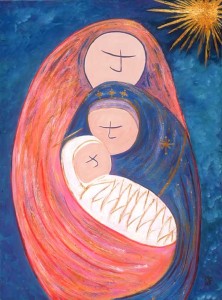 Okay, I’m going to just say it: Christmas actually has nothing to do with giving gifts. Let’s leave the gifts St. Nicholas and the feast of the Epiphany (January 6, the twelfth day of Christmas). Most of the fuss about gift giving on Christmas is purely a twentieth century invention by retailers and made more imperative by the cute song The Twelve Days of Christmas. I’m not against giving gifts. We ought to be generous with our time, talents and monetary resources all year round. But Christmas was not originally linked to such matters.
Okay, I’m going to just say it: Christmas actually has nothing to do with giving gifts. Let’s leave the gifts St. Nicholas and the feast of the Epiphany (January 6, the twelfth day of Christmas). Most of the fuss about gift giving on Christmas is purely a twentieth century invention by retailers and made more imperative by the cute song The Twelve Days of Christmas. I’m not against giving gifts. We ought to be generous with our time, talents and monetary resources all year round. But Christmas was not originally linked to such matters.
We’ve lost touch with the radical (root) meaning of Christmas. Even our religious assumptions have contributed to muddying the meaning of this feast. I’ve been taking a new approach to Christmas for years. And it’s not enough simply to water down the spiritual aspects of Christmas by calling this the holiday season, which is actually an affront to many Christians.
But maybe it’s Christians who ought to lead the way in returning the celebration of Christmas to its roots. So let’s strip away the Christmas tree. It originated as a pagan German symbol made popular in the 19th century by Prince Albert, husband of Queen Victoria of England. And while we’re at it, may we rid ourselves of the Advent and Christmas wreaths? They too originated among pagan Germanic tribes as a way of lighting the cold December darkness in the hope of longer and warmer spring days.
Now that we’ve gotten the shopping and decorations out of the way, Santa Claus (Santa Ni-claus) needs a one-way ticket back to Turkey (he was a 4th century bishop of Myra) and to his proper December 6th feast day. The fat jolly guy in red we’re used to in Great Britain and America was invented as a commercial venture by the American cartoonist Thomas Nast, who was, incidentally, a notorious anti-Catholic bigot.
 So what are we left with? The word: Christmas. Christ-mass is the English name for the celebration of the Mass or Eucharist, on the day of Jesus’ birth. The French call the feast Noël, the word for nativity; the Italians use natale and the Spanish navidad. Thus radically Christmas is about the nativity, or birth of Jesus of Nazareth.
So what are we left with? The word: Christmas. Christ-mass is the English name for the celebration of the Mass or Eucharist, on the day of Jesus’ birth. The French call the feast Noël, the word for nativity; the Italians use natale and the Spanish navidad. Thus radically Christmas is about the nativity, or birth of Jesus of Nazareth.
Okay, so Jesus was born. We are familiar with the stable story and the host of angels and shepherds. Even non-Christian Roman writings acknowledge Jesus existence. What is it about Jesus’ birth that makes Christmas radically meaningful? For Christians it’s the belief that God actually became a man and was miraculously born of Mary as fully God and fully human.
But what about the rest of humanity who may not believe in such claims? What is it about the birth of Jesus that is radically important for all people, no matter what their faith or non-faith? The issue has more to do with Jesus as an adult than as an infant. The main reason why Jesus’ nativity became a celebration in the church was because Jesus’ followers traced back from his death and resurrection to his birth in order to round out his place in history.
But that resurrection matter may be yet another distraction for those who do not believe in such events that purportedly occur outside the realm of the natural world. Here, I think, modern science comes to the rescue. Many physicists understand the makeup of the universe to be interwoven with a series of overlapping energy fields in multiple dimensions of time and space. Energy and matter cannot be lost but it may be transformed and shifted from one dimension in the universe to another. Thus Jesus’ resurrection may have less to do with religion per se than the essence of how we all can be transformed within time and space, united with all energy and matter on the sub-atomic level. And consciousness is simply another high functioning matrix of energy connecting sentient beings with those living our physical sphere and those still living beyond our time and space.
Now we’re getting closer to the root of Christmas. If all matter, energy, and consciousness in the universe are interrelated, interdependent, and connected on the most micro of levels, then we are brought into unity with all matter in the universe, especially all consciousness. The micro brings us into the macro.
Coincidentally those who celebrate the religious feast of the nativity of Jesus say that we are one with each other in the embrace of God’s love. This is why Christians believe that God became a human in Jesus, to drive home this point of unity. He taught that pure love is so amazing that it can bring us together, both living and dead, into the perfect of unities (Heaven).
I began this little post by trying to get at the root of the meaning of Christmas. So here it is:
 The radical meaning of Christmas is the human striving for unity with the universe through unselfish, intentional, and conscious love.
The radical meaning of Christmas is the human striving for unity with the universe through unselfish, intentional, and conscious love.
Imagine if more of us became aware in our gut of the other person in the next cubicle, in the car ahead of us, in the relocation camp or hospital several continents away, as we are for ourselves. Imagine if we stripped away the things we simply want and focused on what we truly need. What if we became more conscious of ourselves, not in a narcissistic way, but with the self-care we deserve, the kindness, gentleness, respect we owe ourselves, and the awareness of the unique way each of us embodies love? Isn’t that what the angel’s message on Christmas really meant? Peace on earth, good will toward all!
Original Artwork, copyright Michael Parise
